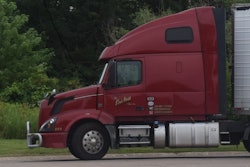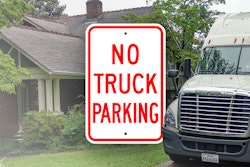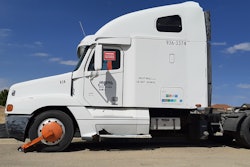After a rash of cities and counties moved to ban truck operators from parking their rigs in their own homes, Overdrive heard from hundreds of readers reporting restrictions on truck parking in their own locales -- a majority of those noted ordinances preventing parking at home or otherwise on-street in residential areas and/or within city limits.
The distribution of various restrictions shown above highlights how the truck parking crisis doesn't simply end for drivers during time off. Bringing the rig home can have its own complications, and in some cases has led to tense standoffs with law enforcement, as previously reported.
These laws/ordinances, enacted by cities and counties, may seem final and intimidating, but remember: This country's political leaders are answerable to their people, and there's a lot of people in trucking. Furthermore, some of the key objections against local truck parking may be founded on little more than myths and rumors that don't hold up to serious scrutiny. By exposing these falsehoods, the trucking community may stand a chance at pushing back.

One reason local governments hate truck parking
One operator, Mateo Lindsey, offered a familiar explanation for why the public so opposes truck parking -- trash, and specifically bottles like you see in the picture below.
 An image that needs no introductionMateo Lindsey
An image that needs no introductionMateo Lindsey
Tyrone Delee, an owner-operator driving since 1985, said he has no problem parking his truck at home on the outskirts of Columbia, South Carolina, when he needs to, but most often he can find an unreserved spot at a nearby truck stop for free.
"It depends on what community you're in," said Delee. "In the suburbs, they don't want you to bring a truck in."
Delee related to people being frustrated by the noise of "big, awkward trucks in the neighborhood," but pointed to the obvious disconnect when it comes to recreational vehicles. The same streets that ban truck parking, said Delee, often enough may still allow big travel trailers or motor homes. "It's kinda crazy, the big old campers are as big as a truck. I don't understand that."
Further, he agreed that the dirty side of trucking's image (note the bottles above), represented "part of the problem" for locals accepting truck parking.
But in defense of truck parking, there are some important points operators can promote within their communities. While truck stops and other roadside parking areas may get their share of litter, does it make sense that any operator would litter their own front yard like that?
Does trucking really tear up the roads?
 Is a tractor-trailer to blame for this pothole on 2nd Avenue in New York City? Or should the city simply have better prepared for a large volume of traffic.David Shankbone via Wikimedia Commons
Is a tractor-trailer to blame for this pothole on 2nd Avenue in New York City? Or should the city simply have better prepared for a large volume of traffic.David Shankbone via Wikimedia Commons
Besides the litter and trucking's image problem, such as it may be, many of the local bans on parking rest on the idea that the heavy equipment tears up roads. Many rules against truck parking or access to surface streets cite a single statistic that's become more fiction than fact, namely that "a single tractor-trailer does the same amount of road damage as 9,600 passenger vehicles.”
This statistic, often bandied about, is essentially a misreading of a 1962 study conducted by the American Association of State Highway and Transportation Officials, AASHTO for short. The American Trucking Associations has in past forcefully pushed back on that claim and with a good history of how it became a sort of standard.
Andrew Braham, an engineering professor at the University of Arkansas-Fayetteville, told Overdrive that if a road is properly designed, there is no reason that a road can’t accommodate large volumes of trucks. The 1962 AASHTO study uses “load equivalency factors,” a standardized way of measuring how much weight an axle puts on the road. These factors are "much, much higher for trucks versus passenger cars," he said, but if the proper factors are used, there's no reason a road can't accommodate large volumes of trucks.
“This simply means that the higher-weight trucks warrant a thicker pavement structure," wrote Braham. He went on to cite a DOT document that outlines a newer method of designing pavements, which use a load axle spectrum instead of the load equivalency factors. The spectrums provide a more accurate representation of the trucks on the road, but the underlying concept is the same: if a road is properly design for the vehicles passing over it, it should not fail.”
A DOT official noted that the organization doesn't really direct localities on how to handle truck parking when drivers are off duty, but encouraged drivers to participate in the local legislative processes to help shape these laws.
As local bans come from local governments, that's the place to confront them. A guide document from the New Hampshire Municipal Association, which itself had input from New York municipal advocates, lays out pretty helpful steps one can take to persuade local governments. They boil down to attending local meetings, getting a group organized, putting a leader in charge of the effort, and applying consistent and prudent pressure on local officials.
The nation's owner-operator population hails from geographically diverse corners of the country, but many rural, less-populous localities have sizable trucking populations. By addressing citizen's concerns about truck parking -- both the waste and the road damage -- professionals do stand as good a chance as anyone of making real impact without having to pick up and move to a new place that's not home but that doesn't restrict parking at the house.
[Related: Truck parking at home: When local governments say no]











